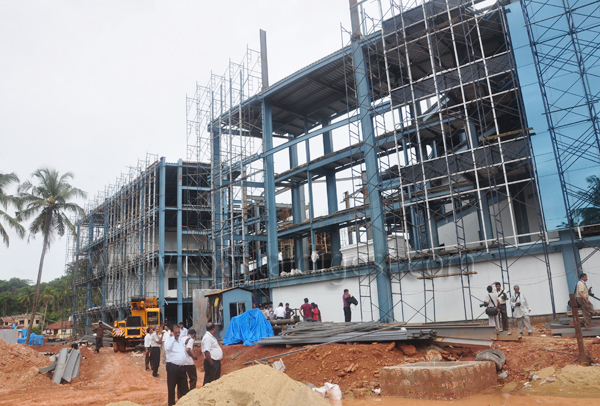
Mangalore, June 8: The construction of Mahesh PU College in Kottara Chowki on Thursday was stopped by officials of the Mangalore City Corporation (MCC) who called the structure “illegal and unauthorised”.
After a raid, conducted by Srikant Rao, MCC Joint Commissioner, along with Revenue Department officials, the corporation put up posters on the structure announcing that MCC was in possession of the property.
According to Mr. Rao, the proprietors had applied for construction permit in April. “Since the development and construction plans were not submitted, their application was kept on hold. However, we got information that construction was continuing,” he said.
The building said to use a novel method of construction in the region, uses rust-free metal pillars and a glass façade. “This is the first of its kind in the region, and we need to go through the plans thoroughly to make sure it can withstand coastal weather conditions,” said Mr. Rao.
College officials at the construction site told the Joint Commissioner that the construction was started after the application was sent in April. “This is an educational institution. We thought the work could go on simultaneously along with the process of obtaining a construction licence,” a college official said.
Mr. Rao called the college officials “arrogant” for ignoring the previous notices by the corporation about the authorisations required, and ordered all construction activity to stop. “After a discussion with the corporation Commissioner, the corporation may initiate legal action against the college management,” he said.
Strangely, most of the three-storey structure had already come up. Workers at the site told The Hindu that construction work started in December, and not April as stated by the College officials. “The foundations go to a depth of around 54 feet, and piling work had to be done. Work has been going almost non-stop since December,” said a contractor.
Sujith Shetty, Director of the Institution, told The Hindu that the construction had not violated any norms. However, he could not confirm if the required licenses were actually in hand at the start of construction.
Fear of flooding
Complaints against the PU College extend beyond corporation officials to the residents of the area. With one part of the college being built directly on a storm-water drain, residents in houses situated adjacent to the college fear that they would have to live with flooding during the rains.
“As the construction has obstructed the drain, water flows into our back yard and into our houses even when there is a drizzle,” K. Komala (70) said. Five houses, consisting of about 20 people, within the compound she owns are in danger of flooding, she said.
Arinalesh, a hotel employee who lives alone with her two little children, said she feared a surge of water into the house during heavy rains. “Already, the water seeps in because the water has been diverted by construction activity into our houses. Snakes and insects may get into the house through this flood water,” she said.












Comments
Add new comment